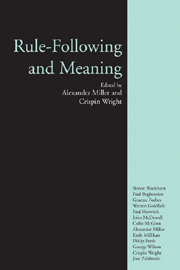Book contents
- Frontmatter
- Contents
- Acknowledgements
- The Contributors
- 1 Introduction
- 2 Skepticism and Semantic Knowledge
- 3 The Individual Strikes Back
- 4 Wittgenstein on Following a Rule
- 5 Wittgenstein, Kripke and Non-Reductionism about Meaning
- 6 Kripke on Wittgenstein on Rules
- 7 Critical Notice of Colin McGinn's Wittgenstein on Meaning
- 8 Meaning and Intention as Judgement Dependent
- 9 The Rule-Following Considerations
- 10 The Reality of Rule-Following
- 11 Truth Rules, Hoverflies, and the Kripke–Wittgenstein Paradox
- 12 Kripke on Wittgenstein on Normativity
- 13 Meaning, Use and Truth
- 14 Kripke's Normativity Argument
- Guide to Further Reading
- Index
8 - Meaning and Intention as Judgement Dependent
- Frontmatter
- Contents
- Acknowledgements
- The Contributors
- 1 Introduction
- 2 Skepticism and Semantic Knowledge
- 3 The Individual Strikes Back
- 4 Wittgenstein on Following a Rule
- 5 Wittgenstein, Kripke and Non-Reductionism about Meaning
- 6 Kripke on Wittgenstein on Rules
- 7 Critical Notice of Colin McGinn's Wittgenstein on Meaning
- 8 Meaning and Intention as Judgement Dependent
- 9 The Rule-Following Considerations
- 10 The Reality of Rule-Following
- 11 Truth Rules, Hoverflies, and the Kripke–Wittgenstein Paradox
- 12 Kripke on Wittgenstein on Normativity
- 13 Meaning, Use and Truth
- 14 Kripke's Normativity Argument
- Guide to Further Reading
- Index
Summary
I want to canvass a third possibility: an account of the central insight of Wittgenstein's discussion of rule-following which is neither Kripkean nor ‘official’. It may be that the ‘official’ view is exegetically correct, and that I do here part company with the intentions of the actual, historical Wittgenstein. But it seems to me that it is an important methodological precept that we do not despair of giving answers to constitutive questions too soon; if the accomplishments of analysis in philosophy often seem meagre, that may be because it is difficult, not impossible.
The rule-following considerations attack the idea that judgements about the requirements of a rule on a particular occasion have a ‘tracking’ epistemology, answer to states of affairs constituted altogether independently of our inclination to make those judgements. How can judgements lack a substantial epistemology in this way, and yet still be objective - still have to answer to something distinct from our actual dispositions of judgement?
A good example of a broadly parallel problem is provided by secondary qualities of material objects – qualities of colour, taste, smell, palpable texture, audible sound, and so on. It is an old idea that, in our judgements concerning such qualities, we respond more to aspects of our own affective phenomenology than to anything real in nature, and there is a corresponding perennial temptation towards an irrealist construal of such judgements. But the irrealist response is, in this case, an overreaction.
- Type
- Chapter
- Information
- Rule-Following and Meaning , pp. 129 - 140Publisher: Acumen PublishingPrint publication year: 2002



